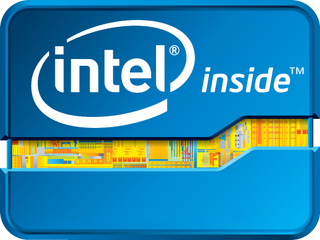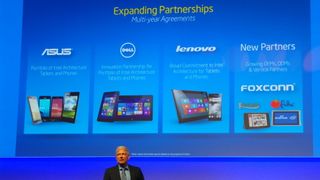Intel unveils 2014 Atom smartphone/tablet chip line-up
22nm Merrifield and Moorefield processors feature revamped architecture and support for 64-bit apps.

Intel continues to fight its way into the mobile market, with the firm confident its forthcoming 4G modem and Atom chips will help it break ARM's stranglehold.
The dual-core Merrifield (early-2014) and quad-core Moorefield (late-2014) ranges will be manufactured using the 22nm process. Intel has used its latest Silvermont CPU architecture, and added out-of-order executions and 64-bit support to boost application performance.
The Atom chips will also support 4G speeds of up to 150Mbps when paired with Intel's discrete modems.
Going forward, Atom chips will have low powered sensors integrated. This will allow devices to provide apps with motion, gestures, audio and location data without draining the battery.
Another key feature is the inclusion of a dedicated Video Signal Processor (VSP). This will allow devices to carry out post processing and frame rate scaling allowing them to show up to 60fps. The Moorefield chip will be able to support screens with resolutions up to 2500 x 1600.
At MWC, Hermann Eul, VP and GM of the mobile comms group at Intel confirmed that Asus, Dell, and Lenovo have signed multi-year agreements to use Atom chips in tablets and smartphones. HP is also using the quad-core variant in its 10in ProPad. Products with Intel's Merrifield chip are tipped for release in the second quarter and Moorefield devices are expected in later in 2014.

Eul added that Intel wants to increase its mobile share by "four times" during 2014. Key to this strategy is multi-OS support, design wins (over 87 tablets) and the ability to cover all segments from entry-level $99 devices through to high-perfomance devices over $400.
Get the ITPro. daily newsletter
Receive our latest news, industry updates, featured resources and more. Sign up today to receive our FREE report on AI cyber crime & security - newly updated for 2024.
Benchmarks
During a pre-brief session with journalists, Intel was keen to show off the performance and power benefits of its Atom chips compared to ARM-based alternatives from Apple and Qualcomm.
Matt Dunford, worldwide client benchmark manager at Intel, showed off a range of slides detailing the Atom's performance and battery life compared to the Snapdragon 800 and Apple A7 chips. A Merrifield chip provided performance increases between 14 - 34 per cent in web browsing, video editing and gaming compared to chips found in the iPhone 5s and the Samsung Galaxy S4.
The true performance of the 2014 Atom range will only become clear once Intel's rivals showcase their latest products. Dunford remained optimistic about how the Atom chips will stack up against the refreshed Snapdragon and A-series processors, though.
"There's two ways of looking at the world. There's looking at the world according to benchmarks and looking at the world of how people actually use their devices," he told journalists during the pre-brief session.
"The vast majority of software will not benefit from more than two-cores, so really more than two-cores is somewhat of a marketing spin at this time. But having said that we have an option for people who demand more than two cores."
Intel pushes 4G
Intel's wireless department has been working overtime to try and get Intel up-to-speed in the 4G space. With the release of its Intel XMM 7260 LTE Advanced modem, the chipmaker has set an ambitious target of becoming the number two player in this market by the end of 2014.
Features of the XMM 7260 include the ability to support up to 22 bands on a single skew, allowing OEMs to more efficiently deploy devices worldwide. It's also got the ability to support a theoretical speeds of up to 300Mbps.
Unlike Qualcomm, Intel has yet to integrate 4G connectivity directly into Atom chips, but it does not see this as a disadvantage.
"It will not be an impairment. Most of the OEM's have chosen a discrete [4G] modem for good reason. The power efficiency and performance of the platform with its architecture is world class. Some [OEM's] are betting designs on it," explained Pierre Herve, director of product planning at Intel.
"The integration comes when you go [into] the lower segment for which we've got architecture called SoFIA."
Devices using the XMM 7260 LTE Advanced are expected to be on the shelf in Q2 2014.




